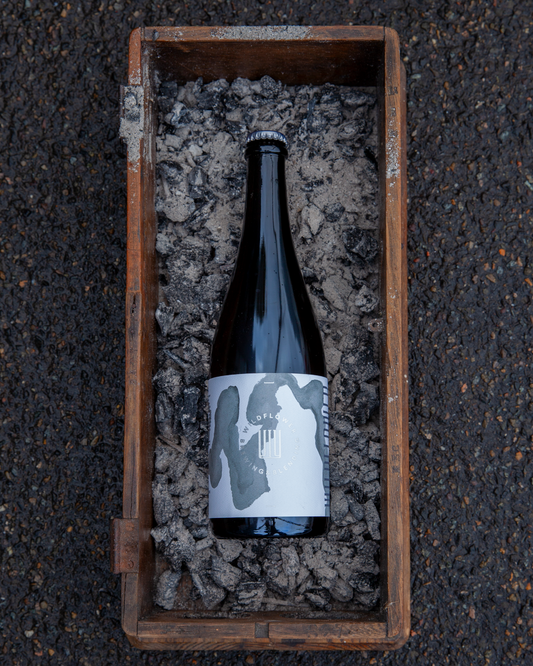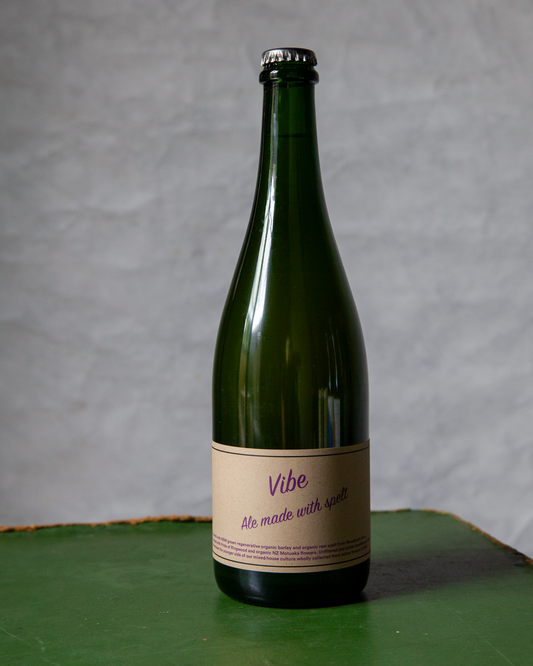We are very excited to announce that Wildflower St Henry 2020 will be available online and for take-away/collection from 12pm (Sydney time) on Friday 4 September 2020.
St Henry is an Australian Wild Ale refermented with apricots. While the beer is named for Chris and his wife Emily's second son, Saint Henry II was a Holy Roman Emperor during the 11th century. In 2020, this beer was made from golden mixed fermentation, barrel aged beer and 380kg of fresh, (partially) tree ripened, whole Trevatt apricots hand picked from Thornbrook Orchard in Orange, NSW.
Cast your mind back to Saturday 21 December 2019... it’s hot. I mean like 40C at 10.30am hot. The Carriageworks Christmas markets are on, our cellar door is open and I’ve just rolled back into town with these orange grenades.

It’s been two years since we have used apricots in a beer. In 2019 the hail which dented much of the cherries also took out the apricot crop. The fruit was light on anyway in 2019 as well due to pollination and the seasonal variances of apricot fruiting. However in 2020, the crop wasn’t affected by fire or hail, but instead the intense lack of water seen in the central tablelands and further west last year. Yeah, the crippling drought which had a lot to do with the bushfires raging north of Sydney but had yet to start on the south coast of NSW.
Paula and her team at Thornbrook Orchard weren’t able to dedicate any of their irrigation water towards the apricots and instead needed those volumes for their cherries. A few weeks before these came off the tree she rang me to tell me that they weren’t in good shape, they were beginning to drop off the tree before they were ripe due to the trees stress of growing them in the first place. She asked if I thought there was anything we could do with them. Never shying away from displaying the season through our beers and also with some small hope that this low cropping fruit would yield quality, intense flavours in the beer like what I’ve heard from mates in wine. So after a few phone calls with winemakers I trust, I asked Paula if she could pick them for us to use. I’ll be honest, when I saw them, my heart sank a little bit… I’ve never seen apricots this small, or this hard. Some of the fruit you could bite into and some of it you couldn’t.
So in order to try to get the most out of this fruit, we decided to process them over a few days. Firstly all the fruit that arrived went into our cellar into a moderately temperature controlled area and we allowed the whole lot of them to slowly soften up. Then on 23 December, Luke Barbuto went one by one through all of these apricots and selected the ones that were soft enough to go into beer. If they were too hard they were left aside to soften for a few more days but the soft ones were sent through a slicer I had fashioned that morning in order to break the skin of the fruit before it went into the tank where it would macerate with beer. About 70% of the fruit was ready to go on the first day and we left the other 30% for another four days before adding it to the tank. The initial apricots in the tank also macerated carbonically during that time. On 27 December, we racked a selection of aged Gold barrels onto the fruit and allowed those barrels to macerate with the fruit for five months. This was a bit of a nervous fermentation for me. I never really saw it kick off and ferment super actively like we see in some of the juicier fruit. Something about lack of water and this one made things a little slower. As per our normal process, we racked the concentrated re-fermentation beer into a packaging vessel and washed the fruit with three more barrels of aged Gold where it laid with the fruit for another month before being combined with the heavier fruiting rate portion. We bottled the beer on 17 June 2020 and allowed it to condition in bottle for 12 weeks before release.
St Henry 2020 has a mouthwateringly intense nose of fresh and candied apricots, there’s soft white blossoms, marshmallow and creamy vanilla notes too. The palate though, so complex. Whilst it does dominant, the sheer intensity of these apricots result in so many more flavours. Spice, stone fruit, musk, Turkish delight, vanilla. Familiar Wildflower citrus and funk bring the long palate to a close. Super engaging, so delicious and impossible to stop drinking.
There are 2,000 x 375ml bottles and 18 x 1.5 litre magnums of St Henry 2020 which will be split between our online shop, cellar door and lovely wholesale accounts across Australia.
Like all our beers, St Henry 2020 is best enjoyed when decanted off a settled natural yeast sediment at cellar temperatures (10-12°C).



